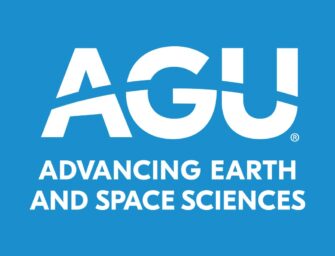AGU Celebrates Open Science and Open Access
By Matthew Giampoala, AGU’s vice president of publications
Last week, AGU hosted another successful Fall Meeting in San Francisco. Our community celebrated its Centennial year and had thoughtful, productive discussions about the future of science and inspiring the next 100 years of innovation and discovery. Since many members had questions about AGU’s efforts to support open and accessible science, the meeting also provided an opportunity to celebrate our contributions through four key initiatives of our non-profit publications program.
1) Encouraging open science
Several AGU townhall events at Fall Meeting focused on open science, were well attended, and fostered great discussion. AGU’s publications team and I also had the opportunity to meet with librarians, representatives of data repositories, as well as 21 of AGU’s journal editorial boards. (Note: The editors of JGR: Oceans will meet during the upcoming Ocean Sciences Meeting in February 2020.) These conversations highlighted AGU’s commitment to open science as we strive to provide the widest possible dissemination for scientific communication to encourage global, inclusive participation.
For example, AGU publications continue to operate as not-for-profit and we have expanded our open access options. Since 2010, all new journals that we have acquired or started have been open access. The journal Space Weather is now fully open access and articles are freely accessible to read, download, and share. All of our other older subscription titles allow an open access option, and this has been growing while overall output has also increased since 2013. In fact, we are proud that 96% of content published in AGU journals since 1997 is free. As avid readers of the Prow know, we also announced the AGU Digital Library will now be an added membership benefit starting in January 2020.
2) Proactively bolstering open access for audiences
AGU provides access to wide audiences through promotion of breaking scientific discoveries and papers. Journal editors highlight notable articles, and AGU’s publicly accessible online magazine Eos provides research spotlights. Articles are free and open to journalists as part of AGU’s regular outreach to the press. AGU also participates in Research4Life, which provides free or low-cost access to publications for audiences in developing countries.
AGU is compliant with Plan S through transitional deals, such as the one highlighted below, and by providing open access options for all our journals. We also support scientists at federal government agencies through our participation in CHORUS, which provides public access to federally funded research from NOAA, USGS, the Department of Energy, and others. Similarly, PubSpace and Pubmed Central allow NASA and NIH scientists, respectively, to deposit their research into accessible databases.
3) Support and benefits for authors
AGU looks to provide many options to authors as well to encourage global participation regardless of funding availability. They can deposit both preprints, as well as accepted peer-reviewed manuscripts, into servers. As another proof point of our commitment, AGU launched a preprint server, ESSOAr. Authors can also choose open access options in any AGU journal they publish in, regardless of whether it requires a subscription. Authors are allowed six months after publication to place their article in an institutional repository and they can make their work accessible on a personal website as well.
In conjunction with our partner Wiley, AGU publications are included in several “publish and read” deals across Europe. These transformative deals provide a mechanism for institutions to pay author open access fees as a bridge to move away from journal subscriptions. Both AGU and Wiley hope to finalize a similar deal with California Digital Library soon, which would provide access to authors in the UC system and at state schools across California.
Since there are many researchers who do not have funding to publish all their research in gold open access titles, and some who are still producing valuable research that is unfunded, AGU’s portfolio means the broadest number of researchers from around the world are able to participate in our journals. For example, approximately 10% of papers published by AGU do not have a major funder listed. Submissions have increased across AGU titles, indicating the value of this mixed model for our community. This range of options, combined with the other open initiatives described above, maximizes availability for all to continue to represent and advance Earth and space science broadly.
4) Continuing work for a culture change in science
Finally, AGU is a signatory of the Declaration on Research Assessment, or DORA, which aims to change how research assessment works by focusing more on ways researchers participate in and support research other than the number of publications and the impact of journals.
We’ve co-hosted townhall events with both the European Geosciences Union and Japan Geoscience Union to spark a culture change in the way science is recognized for promotion and tenure.
AGU also released its updated position statement on data at Fall Meeting. This new statement reaffirms data as a world heritage and provides best practices for working with and sharing data.
These are a handful of examples of AGU’s exciting advancements to our mission of science benefiting humanity. I’m proud to lead AGU’s award-winning publications as our community continues exploring the fundamental questions in our understanding of Earth and the solar system.




There’s an elephant in the room. Could the author please comment on the rumored “AGU signing Coalition letter against open access”?
This is great, but seems contradictory to lobbying efforts to halt efforts to make publicly funded research open to the taxpayers who funded it. Most recently the AGU proudly signed the letter opposing broadening open access to federally-funded research, and making some pretty bold claims about the role of publishers.
https://www.vox.com/science-and-health/2019/12/19/21029902/open-access-trump
https://presspage-production-content.s3.amazonaws.com/uploads/1508/coalitionletteropposinglowerembargoes12.18.2019-581369.pdf
I too would like to hear AGU’s case for signing the letter linked at
https://presspage-production-content.s3.amazonaws.com/uploads/1508/coalitionletteropposinglowerembargoes12.18.2019-581369.pdf
and whether it stands by the content of the letter.